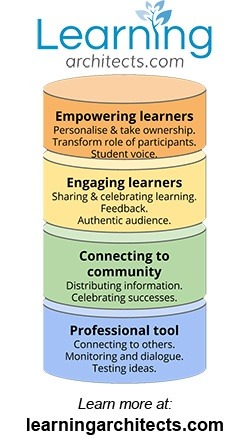How might social media drive real change?

How might social media drive real change?
This series will explore the question how might social media drive real change? A range of issues relating to social media in schools and communities will be examined, with the aim of helping readers in these ways:
-
Define some of the key issues that social media presents for communities, organisations and particularly schools;
-
Explore how teachers and leaders might use social media to deepen engagement and inform decision making;
-
Suggest some practical strategies to help school leaders tackle the social media landscape as it continues to evolve.
In addition to this series of blog posts, you can also choose to receive:
- a free video presentation ‘Social Media for School Leaders’;
- resources to use with your students in the classroom;
- 10 ideas for getting started with social media – for leaders or teachers; as well as
- resources to help leaders use social media effectively with staff, community and for their own growth.
I’ve long wondered how social media could be used to inform better decision making in communities and organisations. It is an area I’ve presented about in the past with an example of how the Golden Circle might apply to the use of Social Media in schools.
How might social media inform school decision making and deepen community engagement?
What are the key issues we need to be aware of as educators and leaders?
This article I will endeavour to provide some answers to these questions.
In this fascinating TED Talk Wael Ghonim describes his experience of the recent revolution in Egypt. It is a great example of how social media can be an enabler of social change – for better or for worse. Wael shares his journey as an activist who used Facebook. He talks about how the groundswell rises up, spills over and then the demise as it turns nasty. Fascinating.

Sign up to receive this free presentation…
Wael goes on to share examples of people spreading rumours and opinions and how acting on these impulses is only a click away, because of the ease of use of the technology.
He contends that we don’t know how to deal with rumours [when using social media]; this isn’t a view that I share because I think there are tools and strategies that can be applied in order to judge the veracity and accuracy of statements others may make. With regard to rumours and views can certainly be spread instantly and virally and they can have the potential to cause damage to the reputation of staff, leaders, and schools.
If unhelpful sharing (or rumours) are left unchecked, these can ultimately damage a community’s sense of self. How might we protect ourselves and our schools from poor social media usage – or at least plan to minimise it while taking advantage of the potential positives that social media can bring for our communities? I think schools can use social media for positive purposes and that communities can learn to do the same.
Wael believes that there are five critical [and negative] influences of social media. These are certainly something to be mindful of as our staff, students and communities increasingly use social channels to interact and connect:
- How do we deal with rumour and innuendo – we don’t know how to deal with rumours – these can be believed and spread extremely quickly. For example, this horror story from the New York Times clearly illustrates this. As mentioned above, I don’t necessarily agree with this notion.
- The echo chamber effect – we create our own echo chambers by communicating with those we tend to agree with. Sort of like a mutual (and virtual) back-slapping exercise. We can mute and block those we don’t agree with in a split seconds
- Speed of deterioration – online discussion can very quickly deteriorate into anger and hateful communication.
- Opinions stick – once we share an opinion or idea (in as short as 140 characters) it ‘sticks’ which means that people may continue to judge us even if our ideas subsequently change and evolve. Wael believes we are less inclined to change our views because of this. Consider this from an employment perspective.
- Broadcast over engagement – social media experience is designed to broadcast and splatter the world with peoples’ ideas. It favours posts over discussions, shallow comments over deep conversations. How can we overcome this?
Now this might sound like doom and gloom, but how might we design social media experience that promotes civility and thoughtfulness in our communities? I have long wondered how this idea could apply in schools – particularly in relation to community engagement and decision making.
If ’school’ is primarily a community endeavour, then surely the community is in a great position to at least contribute to the wisdom that can guide the decisions? These decisions might be about trivial aspects of the school functioning, or they may be major decisions about how the school might operate. For example, curriculum design or as a self-review mechanism.
I wonder, could we use social technology tools in schools to gain feedback from our communities, so that we are better informed as leaders? Could we encourage children to use social media to debate, research, analyse and unpack the ideas or opinions of others?
I’d love to know your thoughts in the comments below.
The second part in this three-part series will explore some different options for how we might use social media for positive purposes to deepen community engagement and (possibly) inform decision making processes.

Facebook Comments